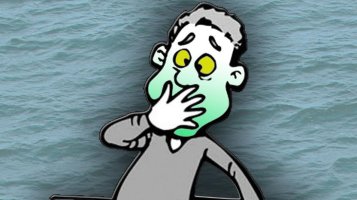Bolo
Contributing Partner

Ahh! "Le mal de mer" The French have such a wonderful way of saying "sea sick". Most sailors I've talked to over the years have experienced "le mal de mer" but there are exceptions, like my first mate. She has never in her life felt what it's like so she's the one I usually send below to make sandwiches or find something in a locker while we're under way. I use to feel sea sick more often but over the years it happens maybe once or twice a year and only under certain conditions like a gray sea and sky.
Guests on beard are another issue all together and that is the point of my post here. Those who are brave enough to come aboard for a sail knowing that they may get sea sick I applaud for their sense of adventure because all adventures have risks, don't they?. I do try and help them out with a few tips. No sailing on an empty or full stomach. Just a bite or two of a sandwich before going out will do. Stay hydrated before and while sailing. No one, even me, is to say the words "sea sick" or elude to the condition. The one sure way I've found to help keep a le mal de mer prone guest under control is to put them right behind the helm as soon as I get the sails up and set. I give them a few tips on how to sail, point to something on the far shore and tell them to steer for it. It seems to work every time because they concentrate on steering and not hitting anything. At least that's what one guest told me after we returned to the dock and she said that she had a great time steering too! Of course I stand right next to them to make sure they stay on course.
But I have had some guests that don't want to steer, ate a big lunch before coming on board and say something like, "I do get sea sick a lot." Then they just sit there and look around or talk to us. After awhile they can get quiet and have that far off stare....I'm sure you've seen it. A look at my first mate and a nod and we're pulling down the sails, starting the engine and heading for the dock...often much to their relief. I never make fun of their condition because it takes a bit of bravery to come aboard when you think you'll get sick and then that's it, isn't it? They talk themselves into "le mal de mer" before they leave the dock. What a shame. What have your experiences been with guests on board and "le mal de mer"?
